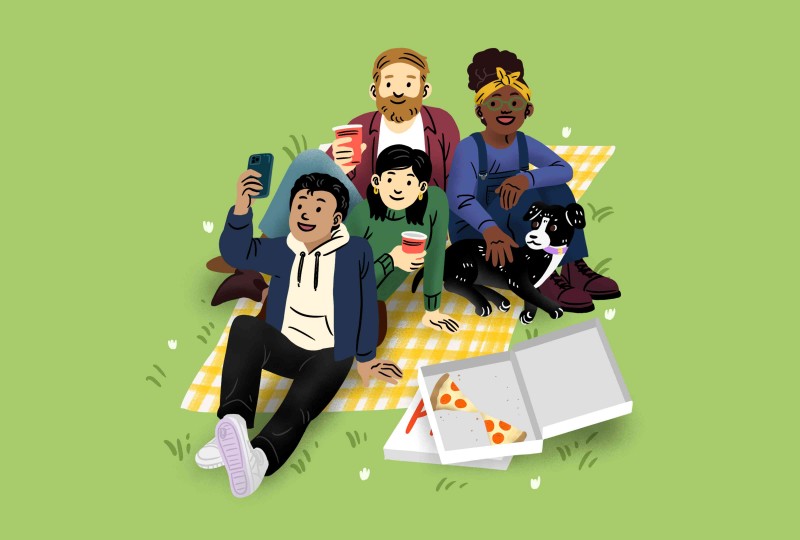
Making friends is an essential part of life. It enriches our experiences, provides support, and adds joy to our days. However, forming meaningful and lasting friendships requires effort, understanding, and a bit of strategy. Here’s a detailed guide on what to keep in mind while making friends.
Friendships play a crucial role in our lives. They offer emotional support, enhance our social skills, and even contribute to better health. Good friends can be a source of comfort and happiness, making life's challenges more bearable.
Having friends can significantly reduce stress and anxiety. Friends provide a sense of belonging, improve self-confidence, and help you cope with traumas such as divorce, serious illness, job loss, or the death of a loved one.
Making and maintaining friendships help improve social skills. You learn how to communicate effectively, resolve conflicts, and build trust.
The first step in making friends is meeting new people. This can be done in various settings:
One of the keys to making friends is to be open and approachable. Smile, make eye contact, and show genuine interest in others.
Initiating a conversation can be intimidating, but it's the first step towards building a connection. Start with a simple greeting or comment on a shared experience or interest.
Being a good listener is crucial. Show that you are interested in what the other person has to say. Nod, make eye contact, and respond appropriately to keep the conversation flowing.
Shared interests and experiences are the foundation of friendships. Discover common hobbies, goals, or experiences that you both enjoy.
Consistency is key in any relationship. Regular communication helps maintain the bond. Use texts, calls, or social media to stay in touch.
Reliability builds trust. Be there for your friends when they need you and keep your promises.
Shared experiences create lasting memories. Engage in activities together, whether it's a hobby, a trip, or simply hanging out.
Conflicts are inevitable in any relationship. Address issues calmly and respectfully. Discussing problems openly can strengthen the bond.
Every individual has boundaries. Respect your friend's personal space and preferences to maintain a healthy relationship.
Friendship is a two-way street. Ensure there is a balance of giving and taking to avoid feelings of resentment.
A good friend is supportive, trustworthy, and makes you feel valued. They respect your opinions and are there for you in good and bad times.
Not all friendships are healthy. Be aware of red flags such as constant negativity, lack of support, or manipulative behavior.
Effective communication is the backbone of any relationship. Practice clear and honest communication.
Empathy involves understanding and sharing the feelings of others. It is crucial for building strong emotional connections.
Confidence attracts people. Work on building your self-esteem to improve your social interactions.
Long-lasting friendships require time and effort. Make an effort to stay connected and show your appreciation for your friends.
Life changes, and so do people. Being adaptable and flexible helps maintain friendships through different life stages.
Celebrate your friend's achievements and important life events. This shows that you care and strengthens the bond.
Diverse friendships enrich your life by exposing you to different perspectives and experiences.
Be supportive during tough times. Offer help, lend a listening ear, and show empathy.
Encourage your friends to pursue their goals and grow as individuals. This creates a positive and motivating environment.
Childhood friendships are often based on shared activities and proximity. Encourage your child to engage in group activities to make friends.
Teenage years are crucial for social development. Encourage teens to join clubs, sports teams, or volunteer groups.
Making friends as an adult can be challenging due to busy schedules. Prioritize social activities and stay open to meeting new people.
Friendships are essential in senior years for emotional support and companionship. Engage in community activities, senior centers, or hobby groups.
Use technology to stay connected with long-distance friends. Video calls, social media, and messaging apps can bridge the gap.
Plan regular visits to spend time together in person. This strengthens the bond and creates new memories.
A handwritten letter or a thoughtful gift can go a long way in maintaining a long-distance friendship. Making friends is a rewarding yet ongoing process. It requires effort, patience, and understanding. By being open, approachable, and supportive, you can build meaningful and lasting friendships. Remember to stay true to yourself and respect others, and you'll find that friendships will naturally flourish.
What kind of diet should a cancer patient follow after chemotherapy, know what the experts say